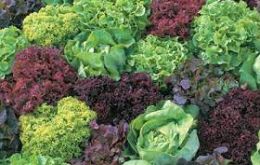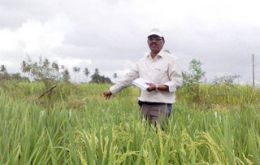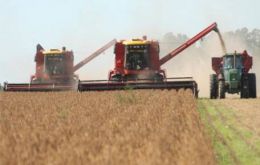MercoPress. South Atlantic News Agency
Agriculture
-
Monday, February 14th 2011 - 21:50 UTC
Political agreement in Paraguay to impose export levies on soybeans and beef

The Paraguayan government is working with Congress to agree on budget cuts and possible tax increases, (levies on beef and soybean exports) that should help balance 2011 expenditure and revenue.
-
Friday, February 11th 2011 - 20:16 UTC
Fruit and vegetables in Chile forecasted to soar 20% because of the drought

Chilean farmers and produce distributors estimate that prices will increase for some fruits and vegetables by as much as 10 to 20% within the next 60 days, due to water shortages in northern and central Chile.
-
Thursday, February 10th 2011 - 22:59 UTC
Another green revolution in the making with the “Green Super Rice”

The world appears to be on the threshold of another green revolution in rice production as a result of an intensive, 12-year partnership between the Chinese Academy of Agricultural Sciences in Beijing and the International Rice Research Institute in the Philippines.
-
Thursday, February 10th 2011 - 07:02 UTC
Brazil poised for another record crop of soybeans: 69/70 million tons

Brazil could harvest a record crop of 70 million tons of soybeans in 2011 because of improved climate conditions and expansion of the area planted according to Hamburg based Oil World consultants.
-
Friday, February 4th 2011 - 21:07 UTC
France and FAO call for greater regulation to curb commodities speculation

France and the U.N. food agency FAO warned on Friday about the risk of a new global food crisis and ensuing riots, calling for greater regulation to curb speculation on commodities markets.
-
Wednesday, February 2nd 2011 - 07:06 UTC
Argentina declares compulsory conciliation to end crippling strike at export ports

Argentina's government has ordered unions to suspend a week-old strike at leading grains ports for a 15-day period to hold talks with company bosses, a Labour Ministry spokesman said on Tuesday.
-
Wednesday, February 2nd 2011 - 01:13 UTC
Soy prices soar as Argentine ports are blocked by week-long strike

The provincial government of Santa Fe home of Argentina's grain export hub has requested the federal government to help end a week-old strike that is delaying shipments from one of the world's biggest food suppliers, the provincial Labour minister said on Tuesday.
-
Wednesday, January 26th 2011 - 18:14 UTC
Argentine Wheat Exports May Fall to Lowest in Almost Three Decades

Wheat sales for the 2009-2010 season in Argentina are primarily from the crop harvested through January 2010, which was curbed by water shortages, reports Bloomberg.
-
Monday, January 24th 2011 - 04:52 UTC
Argentine Farmers End Protest: For Now

The farmers’ strike which has been taking in place in Argentina for the past week ended on midnight Sunday but the leaders have warned that members of the relevant rural entities will meet in two weeks, to discuss further measures and that they do not rule out another strike. The current measures had put a halt to the sale of grains.
-
Thursday, January 20th 2011 - 03:42 UTC
Argentina Farmers Threaten Second Strike of 2011

Argentine farmers threatened to go on strike for a second time this year if the government does not change their policy towards them. At a meeting in Buenos Aires province city, Bahia Blanca, farm workers leaders met to discuss the week-long strike, which began last Monday. Farmers have stopped the sale of wheat, corn and soybean over export curbs.